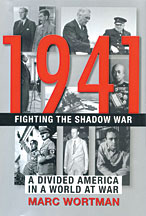In his new book, 1941, Marc Wortman ’78 carries the reader back to what now seems a distant past. Today most Americans agree that the United States must remain engaged in world affairs; seventy-six years ago, as a world crisis mounted, Americans were deeply divided over how the nation ought to respond to German aggression in Europe and Japanese expansion into East Asia. President Franklin D. Roosevelt was, the author notes, “a conflicted leader of an isolationist nation.”

Most of all, Wortman traces FDR’s efforts to lead the divided nation toward involvement in what soon became a world war. A keen student of public opinion, FDR moved “sidewise” toward war, aware of the influence of his isolationist opponents who, the author notes, “cost him the freedom to act against Hitler outside the shadows.” With the collapse of France in June 1940, FDR realized Britain’s precarious position and maneuvered, both in public and behind the scenes, to keep the British in the war. A series of measures followed—the destroyer-for-bases deal in September 1940, Lend Lease in early 1941, the takeover of Iceland in July 1941, and finally in September 1941 the eruption of an undeclared naval war in the Atlantic. Throughout these tumultuous events, FDR moved cautiously, and sometimes deceitfully, relying on a small group of trusted advisers to achieve his goals. Wortman gives a superb account of the way in which FDR used Harry Hopkins on trips to Great Britain and the Soviet Union in 1941 to reach out to Winston Churchill and Joseph Stalin and to measure their determination to stay in the war.
FDR also played for time, hoping that he could—through economic sanctions—deter Japan from moving into Southeast Asia and drawing America into a two-front war. Wortman seems sympathetic to FDR’s dilemmas, but, as his story nears its end, he makes no attempt to render a final verdict on his leadership. With the Japanese attack on Pearl Harbor and Hitler’s declaration of war against the United States, “the bitter fight, the uncertain hours, the indecision were over.” 1941 explores the twisted path that brought America into World War II and ultimately changed its role in world affairs.
Charles E. Neu is a Brown professor emeritus of history.





